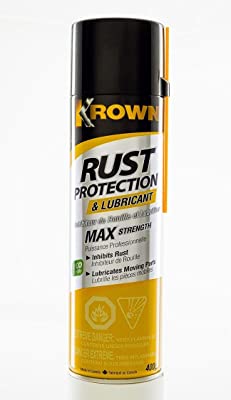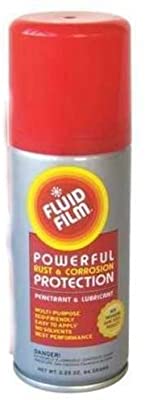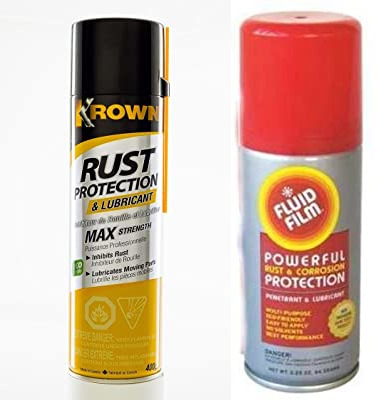Both are great for controlling rust and corrosion. There is so much confusion and debate between Krown and Fluid Film and everyone wants to know which is the right choice. In this article, all things will break down and make things more clear. The major difference between them is clinging to power. The fluid film has more clinging power than Krown. But there is no doubt that both Corrosion-resistant products are incredible.
If you want to keep your favorite car free from rust for a long time then these are definitely top picks. They are undercoating the moving parts of the vehicles for a long time. If you want to save any of these, read the full Comparison Article. Hopefully, you will be able to pick the right spray. Krown is slightly cheaper than Fluid Film.
Krown vs. Fluid Film In a Table
| Basis of comparison | Krown | Fluid Film |
| Manufacturer | Krown | Fluid Film |
| Item weight | 1.14 pounds | 7.58 pounds |
| Product Dimensions | 9.45 x 2.56 x 2.56 inches | 10 x 10 x 9 inches |
| Country of origin | Canada, the USA, and Europe. | |
| Density | It is thicker but not as much as its counterpart. | It is very thick and the fluid film guns are made for thick viscosity undercoating. |
| Color | Variable colors | Fluid Film is a light color sprayer like honey or mustard oil color. |
| Silicon availability | It has a silicon barrier. | It doesn’t contain silicon-based material. |
| Drip duration | Krown may drip or discharge up to 48 hours after spraying or application. | It may drip up to 48 hours to 72 hours after installing or spraying. |
| Pros | A superior quality that helps to withstand high humidity, road salt, and corrosion. | It offers an effortless ‘dripless’ application and an effective alternative to hard-underbody coatings. |
| Cons | It attacks the rubber and weeps holes that ruin the longevity though there is a silicon barrier. | It doesn’t get atomized well in generic spray guns. |
| Key features | It has a hydrocarbon formula that allows it to infiltrate and exempt any seized, rusted, and clotted part. | It features an intricate heating and mixing process for creatine shield against rust and stops existing aerugo on contact. |
| Life expectancy | It lasts for an average of 1 year or more. | It lasts more than 3 years and protects the internal metal from any harsh and unusual damage. |
What Is Krown?

Krown is petroleum-based lubrication that is extremely impeccable to inhibit all types of rust and corrosion. Krown is incredibly safe for the environment. It is a toxic-free, non-flammable, non-reactive, corrosive-proof, any weather rust-proofing lubricant. It has been successfully completing its work for the last few decades.
The most important thing is that it is suitable for any weather whether it is summer or winter. It features invert-spray technology which is widely used for electrical connections, all moving parts, brake cables, slack adjusters, parts storage, and so on. Best product at an affordable price.
What Is Fluid Film?

Fluid Film is an advanced lanolin-based powerful rust and corrosion preventive lubricant. It is a long-lasting, solvent-free, non-toxic, non-hazardous, and eco-friendly product. It has an anti-freezing agent and is great for snowblower chutes.
It is a superior corrosion-protective lubricant and great for all moving parts. Since it is a solvent-free product, it won’t evaporate or won’t even dry from the surface. It prevents corrosion for a long time in all metals. It provides superior lubrication for all moving parts of any vehicle.
Krown vs. Fluid Film: In-Depth Discussion
Here are the details and a broad discussion about their differences. Surely, you will identify which you should pick for your equipment to prevent corrosion.
Basic Explanation
If you want to give your vehicle’s internal and external parts long-lasting security from rust and abrasion, Krown is incredible. This creates a coating on all kinds of moving parts on the insides of the car. In this way, they can prevent any rust and dust to keep the metals free from unusual wear.
Fluid Film is a great corrosion-controlling and protecting lanolin-based lubricant. It provides excellent protection against rust and corrosion for all types of metals. Moreover, it enhances lubrication for all internal and external moving parts. The advantage of applying Fluid Film is it is not going to be sticky, gummy, or tacky.
Density
Krown is a petroleum-based product that is thicker than a Fluid Film rust-proofing product. Due to its high density, it is a bit more sticky. As a result, it has a shorter drip life which is from 1 to 2 days. That means it can stick in any weather.
On the contrary, the thickness of Fluid Film is standard enough to drip for 48 hours to 72 hours. It is a thick viscosity product. Therefore, if you want to make it thinner, you need to mix a little amount of vegetable oil. It gives consistent viability.
Life expectancy
It is less durable than fluid film. But as long as it is in operation, it protects the metals from all kinds of damage. Typically, it lasts about 1 year after application. So you may have to change it every year.
Fluid Film undercoating is very sticky and long-lasting. It protects metals for a long time which is about 3 years. It effortlessly keeps the internal parts away from rust. It resists washing off. Therefore, it cannot be removed with water or wind. Moreover, it keeps the moisture and oxygen away. This is why it does not react with oxygen. As a result, it can easily prevent rust.
Clinging power
The thicker the lubrication is, the more clinging power is. From this point of view, the clinging power of fluid film is more than the opposite of lubricant. However, Krown has also impeccable clinging power but the lifespan matters. It may be less durable but as long as it lasts no type of rust can attack. It is best to change the Krown every winter.
Performance
Krown is the most usable product for both rusty and newcomer vehicles. It absorbs existing rust and pushes away any type of moisture. It significantly lessens the level of corrosion and prevents rust scum.
In contrast, Fluid Film is the perfect addition for any type of vehicle like cars and other light trucks. You can use it on the vehicle’s suspension parts, winter wheels, rear end, and door hinges.
Applications
Krown is made for steel-based metal vehicles. Moreover, it equally provides protection for Aluminum, especially where dissimilar metals are connected. In addition, it is also widely used in electrical components of your vehicle to eradicate moisture and light oily sludge or block.
Counters, you can use Fluid Film on bottom brackets, brake cables, levers, suspension parts, seat posts, nuts and bolts, and many more components.
Safety issue
Both oils are eco-friendly. Some less and some more. The crown is very eco-friendly and does not have a bad odor. Also, it has no side effects. From all angles, it can be said that it is environmentally friendly and does not contain any harmful substances.
Fluid Film is a non-toxic, non-hazardous, eco-friendly, and natural lanolin nature sprayer. It does not contain any kind of ozone-depleting substance which keeps the air free of toxins. However, it is not a biodegradable product that may cause little damage in the surrounding area.
Expenses
When it comes to price, the price of a Krown is lower than its counterpart. The average price of a crown is between $20. The fluid film, on the other hand, costs a little more. By the way, the thing that is a good price is a little more. Its price is an average of $26.
Final Word
It is very difficult to find out the difference between Krown and fluid Film. However, some important differences are discussed in this article. If you are looking for a reliable and high-quality spray at a low price, you may go for Krown. It’s great in any weather. Moreover, it has many good aspects. On the other hand, if you want to keep your essentials rust-free for a long time, you can go for the fluid film. Now, you decide which one you’re going to take.
Read also:
- Wool Wax Vs Fluid Film- Comparison With Table
- Can Low Differential Fluid Cause Vibration?
- PB Blaster vs. Wd 40 – What Are The Major Differences?
- Purolator Boss vs. Mobil 1- Which Is The Best Oil Filter?
- Bg 44k Vs Seafoam (With Table)- What Are The Main Differences?
- Monstaliner vs. Raptor Liner (Difference In Table): which is the best?
- Berryman B12 Vs Seafoam: Difference With The Table

